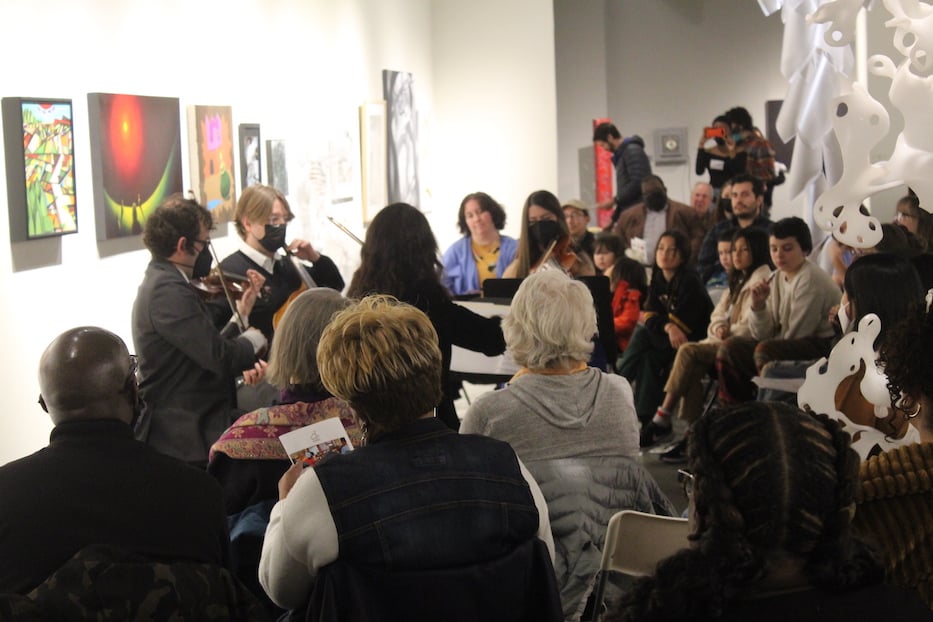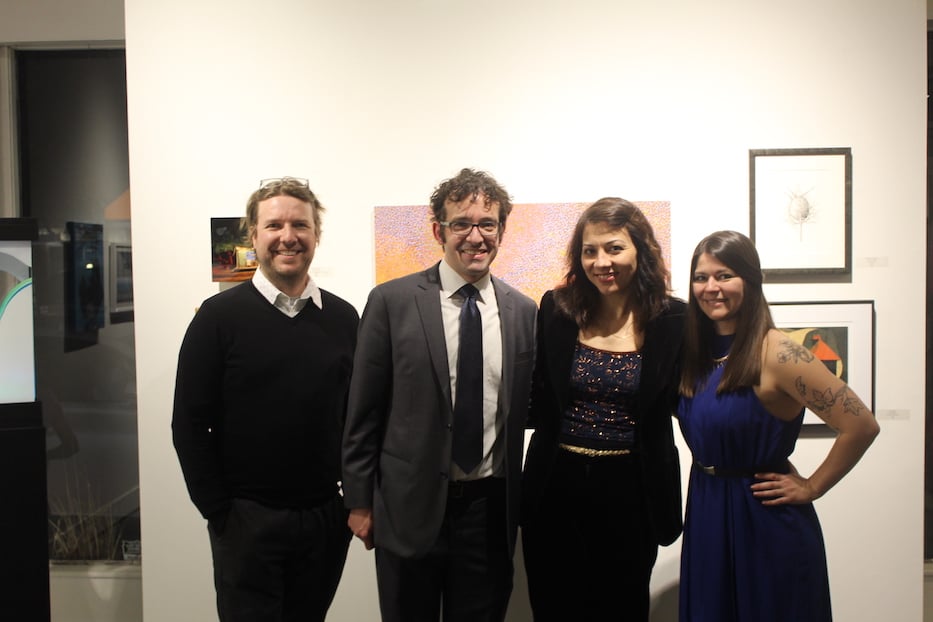
Makeda Murray Photos.
The violins and violas crooned the familiar melody of Nina Simone’s “Feeling Good” while the deep full-length strokes of the cello kept the pace. The mellow and sharp sounds contrasted with each other in a sort of dance. As each musician played with precision through their final exchange, applause and cheers arose from the audience.
That was the scene and the sound last Saturday night, as the Haven String Quartet brought its pops celebration of Black History Month to Kehler Liddell Gallery in Westville. Playing for a packed house, the quartet flowed through music by Stevie Wonder, Beyoncé, George Walker, Nina Simone, Adolphus Hailstork and others before the end of the night. Many in the audience were so moved that the quartet stayed and played on for a two-song encore.
“This show is a jewel of inspiration for me,” said Yaira Matyakubova, artistic director at Music Haven and principal violin in the Haven String Quartet. “The artists that were presented today were the artists that inspired me throughout my career. When you think of American Music, it’s the music of Stevie Wonder, Nina Simone, Duke Ellington. That’s what American Music is, and that’s what people try to imitate everywhere else in the world.”
The concert was a collective effort, Matyakubova added. In a yearlong project, composer Luis Gustavo Prado arranged works including Norman Gimbel’s “Killing Me Softly” (as popularized by Roberta Flack and later the Fugees), Simone’s “Feeling Good,” Stevie Wonder’s “I Just Called To Say I Love You,” and Alicia Keys’ “Fallin’” for the quartet to bring to life.
“He made it possible for the quartet to sound like a human voice,” Matyakubova said. “ He crafted the introduction for each song, he brought out the heart of each song.”
That was evident as musicians played Saturday night, strings filling the space with centuries of sound. No sooner had the group dipped into the first movement of Adolphus Hailstork’s String Quartet No 1 than the strings were quick and aggressive, as if each instrument was arguing with the other three onstage.
It especially showcased the range of the violins, who played through a sort of “argument” that had them in constant conversation. Alongside them, the cello remained smooth. This captivated the listeners, who gazed at the musicians intently until the final measure.
The music spanned genres, from orchestral works to popular music that has become part of the American canon. Before playing Nina Simone’s “Feeling Good,” Matyakubova said that she hopes musicians will one day study the work of Simone “in the way that we study classics these days.”
“Nina Simone’s voice is the voice of her entire generation,” she added.
As the group played, the deep strokes of the cello contrasted with the high pitch of the violin and viola. The audience remained fixated on the quartet, their attention focused on the performers up until the last note. Barely a few seconds had passed before the group broke into applause.
In the gallery, which recently opened its juried show Light, audience members loosened up, some dancing to the music from their seats. As the mellow harmonies enveloped the room, audience members bopped their heads and shrugged their shoulders to the music.
When the quartet moved into “Killing Me Softly,” which may now be defined by Lauryn Hill’s vocals on the Fugees’ adaptation, musicians delivered once again. When some of the notes were played pizzicato—meaning musicians plucked the strings of the violin and viola—it sounded like a clear, sharp human voice. As the song progressed, each instrument rang out in perfect harmony, with the warm tones filling the room.

Members of the Haven String Quartet: Philip Boulanger (cello), Gregory Tomkins (violin), Yaira Matyakubova (violin), and Annalisa Boerner (viola). Maked Murray Photos.
Speaking to the audience in between numbers, cellist Philip Boulanger remembered hearing Flack’s version of the song for the first time and finding it “pretty amazing” He noted that the Fugees’ cover has also become part of American music history.
To laughs, one audience member suggested there was no need to choose between the two, noting that “I like ‘em both, I like ‘em both.” To it, they could now add a string version.
Before the end of the night, the quartet also introduced audience members to “Adoration,” a short piece by historically overlooked composer Florence Price. Once again, it sounded as if there were a conversation between the cello, violins and viola. The deep bellow from the cello seemed to pose a question, and the violins and viola answered persistently.
This dialogue culminated in a harmony that resounded in the venue and hypnotized the audience. When the exchange ended with the final note, the audience members began to stand and applaud in admiration. As traffic passed by on Whalley Avenue, the space remained a musical sanctuary.
That’s not too uncommon for the organization, Matyakubova later noted in a phone call after the concert.
“We don’t just provide music lessons,” she said. “Music Haven is like a family.”
This piece comes to the Arts Paper through an alumni continuation of the Youth Arts Journalism Initiative (YAJI), a program of the Arts Council of Greater New Haven. Read more about the program by checking out the"YAJI" tag. Makeda Murray is an alum of the 5th YAJI cohort and is a junior in New Haven, where she is homeschooled.